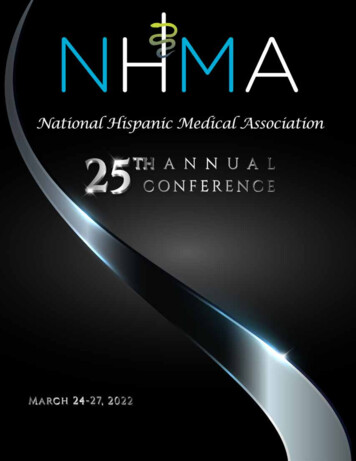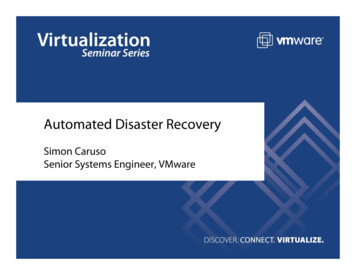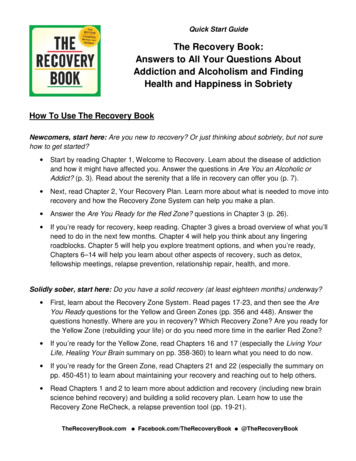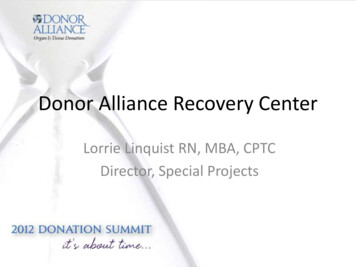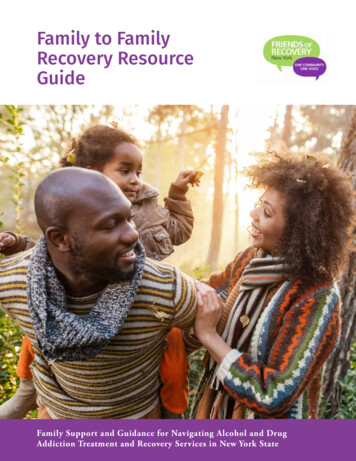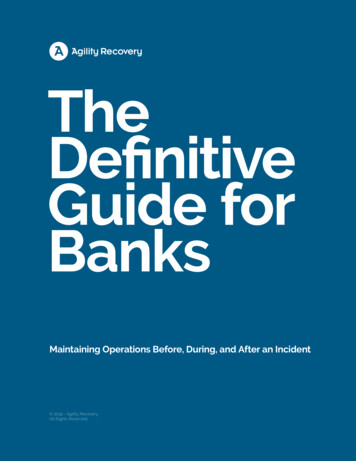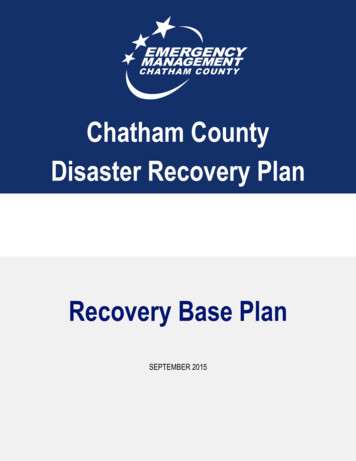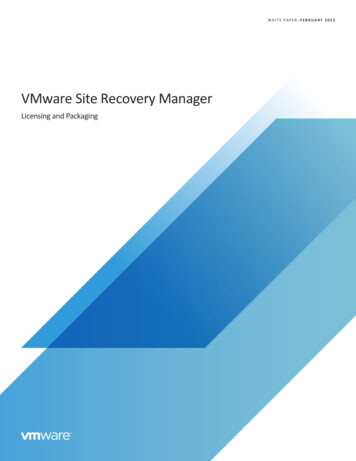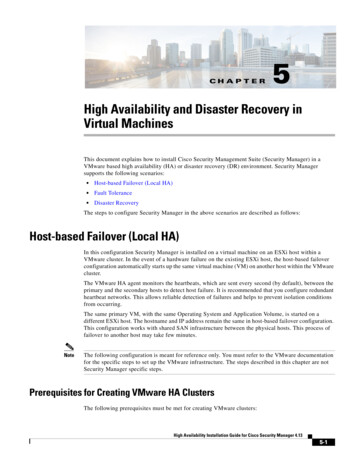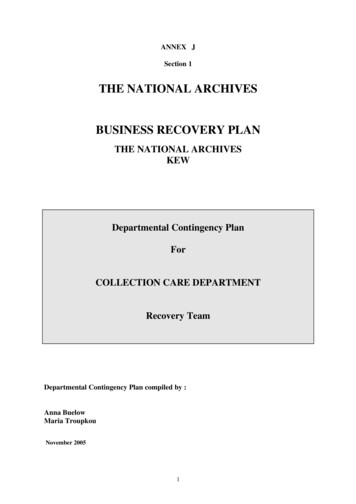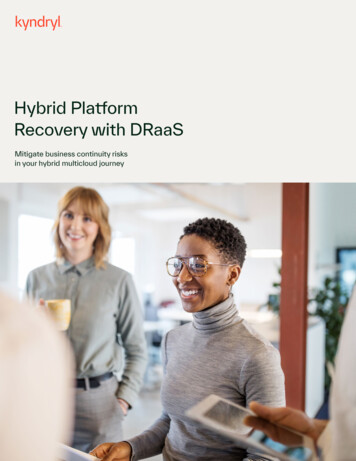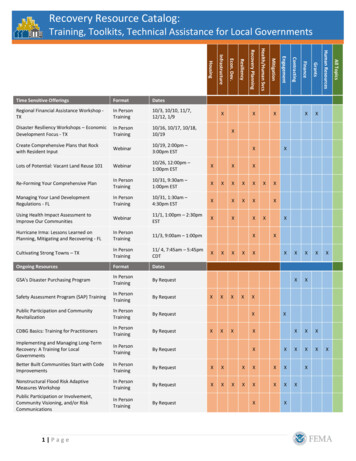
Transcription
Recovery Resource Catalog:Training, Toolkits, Technical Assistance for Local Governments10/19, 2:00pm –3:00pm ESTLots of Potential: Vacant Land Reuse 101Webinar10/26, 12:00pm –1:00pm ESTXRe-Forming Your Comprehensive PlanIn PersonTraining10/31, 9:30am –1:00pm ESTXManaging Your Land DevelopmentRegulations - FLIn PersonTraining10/31, 1:30am –4:30pm ESTUsing Health Impact Assessment toImprove Our CommunitiesWebinar11/1, 1:00pm – 2:30pmESTHurricane Irma: Lessons Learned onPlanning, Mitigating and Recovering - FLIn PersonTraining11/3, 9:00am – 1:00pmCultivating Strong Towns – TXIn PersonTraining11/ 4, 7:45am – 5:45pmCDTOngoing ResourcesFormatDatesGSA's Disaster Purchasing ProgramIn PersonTrainingBy RequestSafety Assessment Program (SAP) TrainingIn PersonTrainingBy RequestPublic Participation and CommunityRevitalizationIn PersonTrainingBy RequestCDBG Basics: Training for PractitionersIn PersonTrainingBy RequestImplementing and Managing Long-TermRecovery: A Training for LocalGovernmentsIn PersonTrainingBy RequestBetter Built Communities Start with CodeImprovementsIn PersonTrainingBy RequestXXNonstructural Flood Risk AdaptiveMeasures WorkshopIn PersonTrainingBy RequestXXPublic Participation or Involvement,Community Visioning, and/or RiskCommunicationsIn PersonTrainingBy Request1 XXXXXXXXXXXXXXXXXXXXXXXAll TopicsWebinarXXHuman ResourcesCreate Comprehensive Plans that Rockwith Resident InputGrants10/16, 10/17, 10/18,10/19FinanceIn PersonTrainingXContractingDisaster Resiliency Workshops – EconomicDevelopment Focus - TXXEngagement10/3, 10/10, 11/7,12/12, 1/9MitigationIn PersonTrainingHealth/Human SvcsRegional Financial Assistance Workshop TXRecovery PlanningDatesResiliencyFormatEcon. Dev.InfrastructureHousingTime Sensitive Offerings
By RequestNHMA Workshops on Resilience andDisaster Risk ReductionIn PersonTrainingBy RequestXImplementing and Digital HistoricPreservation Survey and Assessment forDisaster ResponseIn PersonTrainingBy RequestXXXGIS for Cultural Resources: AnIntroductionIn PersonTrainingBy RequestXXXHistoric Preservation and HazardMitigation PlanningIn PersonTrainingBy RequestXHistoric Preservation and Certified LocalGovernmentsIn PersonTrainingBy RequestXRural and Small Systems SustainableUtility ManagementIn PersonTrainingBy RequestFlorida City/County ManagementAssociationWebinarsAnytimeFlorida Association of City ClerksWebinarsAnytimeFlorida League of CitiesWebinarsAnytimeTexas Rebuilds: Comm Dev &Revitalization, Texas General Land OfficeWebinarsAnytimeTexas ComptrollerWebinarsAnytimeTexas Municipal LeagueWebinarsAnytimeTexas Association of Local HousingFinance AgenciesWebinarsAnytimeTexas A&M AgriLife ExtensionWebinarsAnytimeTexas Commission on the ArtsWebinarsAnytimeV.G. Young Institute of CountyGovernmentWebinarsAnytime2 PageXXXXXXXXXXXXXXXXXXXXXXXXXXXXXXXXXAll TopicsIn PersonTrainingHuman ResourcesXEnvironmental Sustainability Planning andAssessmentGrantsXBy RequestFinanceXIn PersonTrainingContractingXEnvironmental Sustainable BusinessEngagementRecovery an SvcsEcon. Dev.InfrastructureHousingXOngoing Resources
All TopicsHuman ionHealth/Human SvcsRecovery PlanningResiliencyEcon. Dev.InfrastructureHousingOngoing ResourcesFormatDateEDA (Economic DevelopmentAdministration)WebinarsAnytimeHUD (Housing and Urban Development)WebinarsAnytimeFEMA (Federal Emergency ManagementAgency)WebinarsAnytimeInternational City/County ManagementAssociationWebinarsAnytimeNational Association of DevelopmentOrganizationsWebinarsAnytimeAPA (American Planning Association)WebinarsAnytimeXThe Foundation CenterWebinarsAnytimeXNational Hazard Mitigation AssociationWebinarsAnytimeNational Charrette InstituteWebinarsAnytimeSmartGrowth OnlineWebinarsAnytimeGIS Maps & DataToolkitAnytimeXXXXXXXCDBG-DR ToolkitToolkitAnytimeXXXXXXXCommunity Recovery ManagementToolkitToolkitAnytimeCommunity Facilities InfrastructureToolkitToolkitAnytimeAPA Post-Disaster Recovery BriefsToolkitAnytimeEmergency Management Virtual Toolkitfor Education Agencies Serving K-12SchoolsToolkitAnytimeCommunity Planning Assistance TeamsOtherTechnicalAssistanceBy Request3 PageXXXXXXXXXXXXXXXXXXXXXXXXXXXXXXXXXXXXXXXXXXXXX
XXBy RequestXXXBy RequestXXXXXCourse Title: Regional Financial Assistance Workshop – TEXAS SPECIFIC RESOURCEDate: November 7, December 12, January 9 Register HereLocation: Various citiesDescription: The Texas Water Development Board (TWDB) is pleased to invite you to a new style ofworkshop that provides valuable information while allowing for more one-on-one opportunities todiscuss your project needs. Your Regional Project Team, along with TWDB Program Coordinators, will beat the workshops to discuss specific projects and answer any questions you may have. Brief but informative overview of the TWDB and the types of financing available Handouts and helpful resources pertaining to TWDB financial programs One-on-One meetings with TWDB staff to explore funding options for your projectsFormat: In person trainingDelivery: Workshop with 1 on 1 assistanceCost: Free but must registerAudience: Local and regional government staff and officials, urban planners, public works andinfrastructure managers, economic development officials, municipal financial managers, localcommunity stakeholdersGroup Offering: American Planning AssociationContact: /regional project teams.aspXAll TopicsManagement TopicsTIME SENSITIVE OFFERINGS - MUST REGISTER4 PageHuman ResourcesXGrantsXFinanceXContractingRecovery IssuesXBy RequestEngagementMitigationInternational Economic DevelopmentCouncilHealth/Human SvcsNMHA Peer ConsultsBy RequestRecovery PlanningState-led Silver Jackets ResiliencyThe Safety Assessment ProgramDateEcon. Dev.FormatInfrastructureHousingOngoing Resources
Course Title: Texas Disaster Resiliency Workshops – Economic Development Focus– TEXAS SPECIFIC RESOURCEDates:Oct. 16 – Victoria Chamber of CommerceOct. 17 – Bay City Chamber of Commerce & AgricultureOct. 18 – Houston Northwest Chamber of CommerceOct. 19 – Galveston Regional Chamber of CommerceRegister HereDescription: No business can tolerate downtime, regardless of the circumstances. IBM understandsthis, so to help small and medium-sized businesses (SMBs) recover after disaster strikes – and to assistparticularly following Hurricanes Harvey and Irma – IBM is offering recovery support to SMBs inaffected areas through a partnership with the U.S. Chamber of Commerce Foundation. IBM ResiliencyServices deliver business continuity and disaster recovery capabilities as well as cloud solutions tosupport your business across all environments, particularly during this time of recovery. The followingtwo services are available at no charge, through a grant from IBM.Workshop participants will work with IBM resiliency and business continuity experts to start applyingcontinuity planning concepts that can help develop a recovery and continuity-of-operations plan.This plan will include considerations for future, longer-term preparedness.Delivery: In personFormat: WorkshopCourse Title: Create Comprehensive Plans that Rock with Resident InputDate: October 19, 2:00pm – 3:00pm EST, Register HereDescription: For National Community Planning month, we focus on creating successful comprehensiveplans that residents feel a sense of ownership about and have a stake in the outcomes. On this call,you’ll hear from three planners who got residents involved through the Community Heart & Soul model.Learn how community engagement leads to meaningful comprehensive plans that align vision andactions based on what matters most to residents. Format: Webinar. Live Panel DiscussionCost: Free but must registerFormat: WebinarAudience: Local Government staff and officials, Urban and Regional Planners, Community Developers,Community AdvocatesGroup Offering: Orton Family Foundation-Community Development – Heart and Soul programContact: programs@orton.orgCourse Title: Lots of Potential: Vacant Land Reuse 101Date: October 26, 12:00pm – 1:00pm EST, Register HereDescription: Maybe houses were demolished—one, or dozens, or many, many more. Or a factorymoved out of town and its buildings were knocked down. Perhaps both! Whatever the reason, yourcommunity finds itself with a surplus of vacant land. What does it take to develop an effective plan for5 Page
vacant land reuse – and how can you translate that plan into action? This webinar will walk you throughthe foundations of vacant land reuse planning and implementation. It will explore the roles of data,policy, and processes, community engagement, project design, and maintenance. And because vacantland often exists in the context of historic (and continuing) power imbalances that prevent some groupsfrom accessing, or having a say in, vacant land reuse, the process will focus on equity, and meetingcommunity needs, at all stages. You’ll walk away with a clearer sense of next steps to develop a vacantland reuse strategy in your community.Cost: 45Format: WebinarAudience: Local Government staff and officials, Urban and Regional Planners, Community Developers,Community AdvocatesGroup Offering: Center for Community ProgressContact: Justin Godard, jgodard@communityprogress.netCourse Title: Re-Forming Your Comprehensive Plan – FLORIDA SPECIFIC RESOURCEDate: October 31, 8:30am – Noon EST, Register HereDescription: Evaluating your Comprehensive Plan. Explore guidelines and techniques for improving thetools for planning and growth management. Organizing and writing your Comprehensive Plan. Learnabout guidelines and techniques for improving your comprehensive plan. Each local government inFlorida is required to adopt and maintain a comprehensive plan that meets the requirements of Chapter163 F.S. The effectiveness of these plans is greatly enhanced through a logical and understandableorganization and the application of sound drafting techniques and protocols.Cost: 75Format: In-person trainingAudience: Local Government staff and officials, Urban and Regional Planners, Community and EconomicDevelopment professionalsGroup Offering: Florida Association of CountiesContact: Becky Berentsen, bberentsen@fl-counties.comCourse Title: Managing Your Land Development Regulations - FLORIDA SPECIFIC RESOURCEDate: October 31, 1:30pm – 4:30pm EST, Register HereDescription: Explore guidelines and techniques for the writing of land development regulations. “Whenyou are writing laws, you are testing words to find their utmost power (Mantel)”. You are writing forposterity – be clear and concise. Organization and Formatting. Drafting Goals. Drafting Guidelines. Whoshould draft ordinances?The development review process is a central and indispensable part of every community’s planning andgrowth management system. The complexity of land development regulations in Florida place a highpremium on efficiency, consistency and predictability. Share your experiences and lessons learned withyour peers on the following topicsCost: 75Format: In-person training6 Page
Audience: Local Government staff and officials, Building Code and Zoning Review Staff, Urban andRegional Planners, Community DevelopersGroup Offering: Florida Association of CountiesContact: Becky Berentsen, bberentsen@fl-counties.comCourse Title: Using Health Impact Assessment to Improve Our CommunitiesDate: November 1, 1:00pm – 2:30pm EST, Register HereDescription: The use of Health Impact Assessment (HIA) has grown substantially over the past decade,with much of the practice taking place in response to proposed policies and projects in the fields ofurban planning and transportation. Join us for a comprehensive review of how HIA has been used inplanning, and how you could apply principles of the practice in your everyday work. Anna Ricklin, AICP,will share results from a national scan of planning-related HIAs and present a simple toolkit for localplanners to use to think more systematically about health. In Kane County, IL, proposed policies onfarmland preservation triggered the Growing for Kane HIA, developed in collaboration with communitymembers and partners from across sectors. Jackie Forbes, a planner with the Kane County, will share theexperience of the process, the results and the actions that followed.Cost: freeFormat: WebinarAudience: Local Government staff and officials, Health and Human Services professionals, Urban andRegional Planners, Community DevelopersGroup Offering: SmartGrowth OnlineContact: Heather Poston, heather.poston@maryland.govCourse Title: Hurricane Irma: Lessons Learned on Planning, Mitigating and RecoveringFLORIDA SPECIFIC RESOURCEDate: November 3, 9:00am-1:00pm EST, Register HereDescription: Hurricane Irma was the first category 3 or above hurricane to reach the Florida mainlandsince Wilma in 2005. Like Irma, Wilma also made landfall in the greater Naples area. Unlike Wilma, Irmawas a massive storm, referred as one of the biggest and strongest Atlantic Hurricanes ever to hit theUnited States. How do cities and counties prepare to deal with disasters like this? What efforts areundertaken to mitigate the potential damage created by such a storm, and what and why are certainrecovery efforts implemented? A panel of seasoned professional local government managers inSouthwest Florida will discuss these issues and more. They will cover lessons learned throughout theircareers and offer specific perspectives regarding Irma. Attendees are encouraged to ask questions andto offer their own stories during this extraordinary program.Cost: 49- 74Format: In-person trainingAudience: Local Government staff and officialsGroup Offering: Florida City County Management Association, Co-Sponsored by FGCU ICMA StudentChapterContact: Carol Russell, crussell@flcities.com7 Page
Course Title: Cultivating Strong Towns – TEXAS SPECIFIC RESOURCEDate: Sat, November 4, 2017, 7:45 AM – 5:45 PM CDT, Register HereLocation: Frisco, TXDescription: Putting Strong Towns & incremental development principles into practice. Join us for a oneday crash course on practical first steps to overcoming the status quo and growing community capital. Building Strong Towns ROI-based planning Incremental development through small projects Neighborhood cultivation and becoming a small developer Local workforce development and apprenticeship programs Economic gardening Tactical activation and citizen engagement The new government model: Syncing and simplifying plans, codes, internal developmentprocesses/policiesFormat: In-person, workshopCost: 150Audience: Mayors, City Managers, City Department HeadsGroup Offering: Cultivate CollaborativeContact: events@cultivatecollaborative.orgONGOING RESOURCESIN PERSON TRAININGCourse Title: GSA's Disaster Purchasing ProgramHow to Leverage the Federal Government's Buying Power in Preparation, Response, and Recovery to aNatural DisasterDescription: This course provides an overview of the Government Service’s Administration (GSA)Disaster Purchasing Program for state and local governments. It outlines the details of the program andprovides a tutorial on how to buy supplies and services from all GSA Schedule Contracts to facilitaterecovery from a major disaster.Format: Classroom with lecture and discussionDelivery: In-personClass Duration: 1.0 Hour to up to 1/2 day, depending on needs and discussion8 Page
Audience: State, City, County, and Municipal Governments; State-funded Independent School Districts,Colleges, and Universities.Cost: FreeGroup Offering: GSA - Customer and Stakeholder Engagement OfficeContact: Mark King, mark.king@gsa.gov, 512-364-3298Course Title: Safety Assessment Program (SAP) TrainingDescription: The AIA building Safety-Assessment Program (SAP) training provides building officials,architects, and engineers nationwide with the technical knowledge and protocol to assess the safety,habitability and condition of buildings, and infrastructure in the aftermath of a disaster. Instructors ofthis all-hazards course share experiences from the field and walk attendees through interactive casestudies demonstrating common damage and safety precautions. Qualified professionals will receive aBuilding Evaluator certificate and ID card from the State of California and Applied Technology Councilfield manual, and will be able to deploy into the field as a volunteer or through mutual aid assistance.Format: WorkshopDelivery: In-personClass Duration: Full dayAudience: Certified building officials and inspectors; Licensed architects; civil, structural,and geotechnical engineersCost: VariesGroup Offering: American Institute of Architects (AIA) Disaster AssistanceContact: Rachel Minnery, rachelminnery@aia.org, (202) 626 7329Course Title: Public Participation and Community RevitalizationDescription: Course provides overview of public participation demands, P2 frameworks, process designand technique selection, communications, lessons learned from major recent disaster experiences, andbest practice case studies on successful community transformations.Format: WorkshopDelivery: In-personClass Duration: Half-day/Full-dayAudience: Municipal staff and Elected Officials, civic institutions, community stakeholders and nonprofit leadersCost: FreeGroup Offering: Center for Communities by Design, American Institute of ArchitectsContact: Joel Mills, Senior Director, Center for Communities by Design, (202) 626-7405,joelmills@aia.orgCourse Title: CDBG Basics: Training for PractitionersDescription: The course will provide a basic, but comprehensive overview of the CommunityDevelopment Block Grant (CDBG) Program. This course will provide a hands-on approach to learning theprogram through lecture and in-class exercises. Course participants will learn how to read the9 Page
regulations, how to determine timeliness in spending CDBG funds, what activities are eligible under theprogram, how to document national objectives, and how to calculate Low-Mod Income (LMI) benefit.Participants will also learn important program definitions, the components of the Consolidated Plan andthe Annual Action Plan, what’s covered under the administration and planning activities, and granteeresponsibility for monitoring sub-recipients. Class participants will also learn the difference between asub-recipient, contractor, and a Community-Based Development Organization (CBDO) and their roles, asoutlined in the regulations. Class participants will learn important financial administration informationrelated to program management and other federal cross-cutting regulations related to the program.Format: Classroom with lecture and discussionDelivery: In-personClass Duration: 3 DaysAudience: Local Governments receiving or applying for CDBG fundingCost: 350 for members/ 450 for non-membersGroup Offering: National Community Development AssociationContact: Steve Gartrell, sgartrell@ncdaonline.orgCourse Title: Implementing and Managing Long-Term Recovery: A Training for Local GovernmentsDescription: Provides an introduction to recovery implementation, offering a survey of what’s needed tomanage and achieve long term recovery from a local government perspective. Ideally, the class is takenafter a community has created a Recovery Plan or has determined which recovery projects it would liketo implement.Format: Workshop with lecture and discussionDelivery: In-personClass Duration: ½ day to full day depending on needs of community and time allotted for discussionAudience: Mayor, Deputy Mayor, Municipal Finance Officer, Municipal Project Manager, Non-municipalstakeholders active on Recovery Steering CommitteesCost: FreeGroup Offering: FEMA – Community Planning and Capacity Building (CPCB) Recovery Support Function(RSF)Contact: Michael Gumpert, michael.gumpert@fema.dhs.gov 720-415-6499Course Title: Better Built Communities Start with Code ImprovementsDescription: This course is meant to increase the resiliency of a community through the short- and longterm recovery process after a disaster. Ideally, this training is taken when a community is ready to adoptbuilding codes for the local rebuilding process. It promotes the Coastal Construction Code Supplementthat was created by community leaders and Building Code Officials in Coastal Alabama to close the gapbetween existing building codes and the Insurance Institute for Business and Home Safety’s (IBHS)FORTIFIED Home Technical Standards. It is meant to be adopted in addition to local building codes andincludes the recommendations of the IBHS construction method, FORTIFIED Home . This supplementalcode is updated regularly by IBHS to keep it current based on the latest science and testing conducted atits research Institute. These additions have been proven to greatly improve the performance of a homeduring hurricanes and wind-driven rain, by reducing damage, insurance costs and losses during severeweather events.10 P a g e
Format: Training with lecture and discussion; follow-up certifications possibleDelivery: In-person (or webinar)Class Duration: ½ day to full day depending on needs of community and time allotted for discussionAudience: Mayor, Deputy Mayor, City Manager, City Council Members, County Commissioners, CountySupervisors, Alderpersons, Planning Director, Building Official, Municipal Project Manager, Nonmunicipal stakeholders active on Recovery Steering CommitteesGroup Offering: Smart Home America and Insurance Institute for Business and Home SafetyCost: FreeContact: Henry “Hank” Hodde, hank@smarthomeamerica.org, 251-206-5634Course Title: Nonstructural Flood Risk Adaptive Measures WorkshopDescription: Workshop provides an understanding of physical and nonphysical flood risk adaptivemeasures such as elevation, flood proofing, acquisition/relocation, public alert warning, evacuationplanning, emergency preparedness planning, and other tools for reducing flood risk and life loss,expediting future flood event recovery, and increasing resiliency.Format: Classroom workshop with PowerPoint presentations, lectures, and open discussionDelivery: In-personClass Duration: 4-, 6-, or 8- hours depending on educational desires of State and local officialsAudience: State Hazard Mitigation Officials, State floodplain administrators, community officials,interested residents and business owners.Cost: FreeGroup Offering: USACE NFPC (USACE National Nonstructural Flood Proofing Committee)Contact: Randall Behm, Randall.l.behm@usace.army.mil, 402-995-2322Course Title: Public Participation or Involvement, Community Visioning and/or Risk CommunicationDescription: Provides training in use of collaborative tools and processes to use internally or externally,training in or development of public involvement and outreach approaches, working with a communityto develop a community vision for recovery, supporting community planning efforts, etc.Format: Webinar, workshops, public meeting, brownbag, etc.Delivery: In-person or webinarClass Duration: 1 hour to one-week, depending on needs of community and time allotted for discussionAudience: Community staff and elected officialsCost: FreeGroup Offering: USACE Institute for Water Resources, Collaboration and Public Participation Center ofExpertiseContact: Melanie Ellis, Regional Outreach Coordinator for the USACE Southwestern Division atMelanie.J.Ellis@usace.army.mil11 P a g e
Course Title: Environmentally Sustainable BusinessDescription: Provides an introduction to the concepts of environmental sustainability, sustainablebusiness case studies, and sustainability plan development. Ideally, the class information is incorporatedearly in business recovery and rebuilding.Format: Workshop with lecture and discussionDelivery: In-personClass Duration: ½ day to full day depending on needs of community and time allotted for discussionAudience: Business ownersCost: FreeGroup Offering: DHS-IP-Infrastructure Development and RecoveryContact: Cherie Peacock, cherie.peacock@hq.dhs.gov, 703-235-2531Course Title: Environmental Sustainability Planning and AssessmentDescription: Provides an introduction to the concepts of environmental sustainability and how todevelop and implement a sustainability plan for municipal government including carbon accounting andgreenhouse gas emissions reduction. Ideally, the class information is incorporated early in recoveryplanning.Format: Workshop with lecture and discussionDelivery: In-personClass Duration: ½ day to full day depending on needs of community and time allotted for discussionAudience: City government including mayors, financial officers, fleet and facilities managersCost: FreeGroup Offering: DHS-IP-Infrastructure Development and RecoveryContact: Cherie Peacock, cherie.peacock@hq.dhs.gov, 703-235-2531Course Title: Natural Hazard Mitigation Association (NHMA) Workshops on Resilience and DisasterRisk ReductionDescription: NHMA (National Hazard Mitigation Association) workshops include expert presentations,tools and resources, and team-building exercises. Presentations are custom-tailored to help youimprove your community’s safety and resilience and to identify issues for resolution andimplementation in mitigation plans and projects.We focus on “Tools You Can Use;” and is based on the NHMA Disaster Risk Reduction Curriculum.Workshops topics are selected to enable your organization to learn about and apply the latest mitigationpractices best suited to your particular community.Workshops may be short, one-day presentations, or two- to three-days. A Workshop may focus on onlyone topic (e.g., legal aspects), or may include a broader spectrum, e.g., multi-hazards, sustainable andresilient development.Format: In person workshopDelivery: In personAudience: Whole Community: officials, floodplain managers, planners, developers and all othersinvolved in community development and redevelopment decision-makingCost: Varies depending on length, travel costs and number of instructors12 P a g e
Group Offering: Natural Hazard Mitigation Association and the Resilient Neighbors NetworkContact: Kim Thiele, nathazma@gmail.com. Website: www.nhma.infoCourse Title: Implementing and Digital Historic Preservation Survey and Assessment for DisasterResponseDescription: Provides an introduction to response and recovery implementation of a digital historicpreservation survey and assessment strategy following a disaster. Using GIS and GPS tools, the strategy,based on one implemented following Hurricane Katrina, focuses on developing a fast and efficient datacollection/exchange to help document and assess the condition of historic resources, facilitating theNational Historic Preservation Act Section 106 obligations of jurisdictions. In addition the fullydeveloped methodology addresses the documentation of resources through accurate GPS datacollection for mitigation purposes.Format: Workshop with lecture and discussionDelivery: In-person or webinarClass Duration: ½ day to full day depending on needs of the audience and time allotted for discussionAudience: Incident command team members, cultural resource specialists, recovery/response teammembers (federal, state and local)Cost: FreeGroup Offering: NPS - Cultural Resource GIS Facility, https://www.nps.gov/crgis/crgis guidelines.htmContact: Deidre McCarthy, deidre mccarthy@nps.gov, 202-354-2141Course Title: GIS for Cultural Resources: An IntroductionDescription: These two training courses complement each other, but can be taken independently fromeach other. The Introduction course provides a basic understanding of GIS functionality as applied tocultural resource management in general. The Advanced course provides a discussion of emergingconcepts and approaches to applying GIS/GPS/Mobile Mapping to cultural resources. Both courses useESRI ArcGIS technology and software.Format: Workshop with lecture and discussionDelivery: In-personClass Duration: 2 full days for the Introduction course; 1 full day for the Advanced course depending onneeds of the audience and time allotted for discussionAudience: Incident command team members, cultural resource specialists, recovery/response teammembers (federal, state and local)Cost: FreeGroup Offering: NPS - Cultural Resource GIS Facility, https://www.nps.gov/crgis/training.htmContact: Deidre McCarthy, deidre mccarthy@nps.gov, 202-354-2141Course Title: Historic Preservation and Hazard Mitigation PlanningDescription: An introduction to historic preservation concerns and hazard mitigation planning. Explainshow a community can focus on their National Register of Historic Places listed, or eligible properties to13 P a g e
prioritize risk due to various natural events. Discussion of how Hazard Mitigation plans function andefforts to integrate cultural resources concerns into such a plan, to help prepare for the next event.Format: Lecture, 45 minutesDelivery: In-person, possibly web-basedAudience: Local governments, commission staff, residentsCost: FreeGroup Offering: NPS- State, Tribal, Local Plans and Grants DivisionContact: Megan Brown, megan brown@nps.gov (202) 354-2062Course Title: Historic Preservation and Certified Local GovernmentsDescription: An introduction to the Certified Local Government program. Jointly administered by theNational Park Service (NPS) and the State Historic Preservation Offices (SHPOs), each local communityworks through a certification process to become recognized as a Certified Local Government (CLG). Oncecertified CLGs become an active partner in the Federal Historic Preservation Program. Local, State, andFederal governments work together to help communities save the irreplaceable historic character ofplaces. Participants will learn about the certification process and understand the fiscal and technicalsupport assistance available.Format: Lecture, 45 minutesDelivery: In-person, possibly web-basedAudience: Local governments, comm
IBM understands this, so to help small and medium-sized businesses (SMBs) recover after disaster strikes - and to assist particularly following Hurricanes Harvey and Irma - IBM is offering recovery support to SMBs in affected areas through a partnership with the U.S. Chamber of Commerce Foundation. IBM Resiliency
